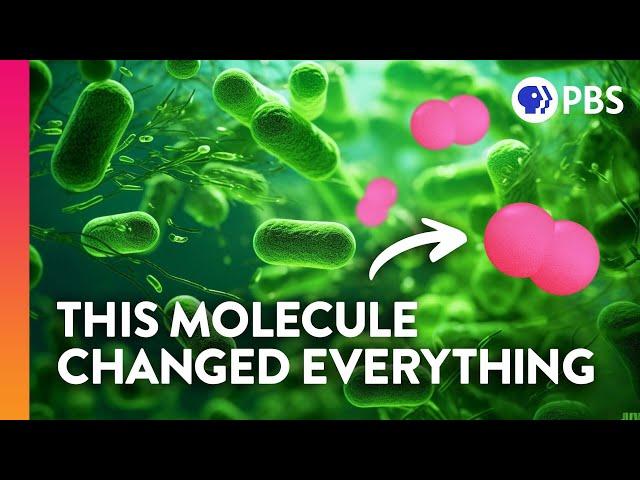
The Deadly Chemistry That Made Life Interesting
Комментарии:

They say you can't live without love, but personally I think oxygen is more important 🤓
Ответить
This video is excellent! You also really need to make that POWERHOUSE OF THE CELL with the thunder a GIF with audio somehow.
Ответить
One intelligent life per universe. That’s how rare we are I believe
Ответить
So photosynthetic life polluted the entire Earth with high levels of corrosive oxygen, causing catastrophic climate change, leading to a later explosion in creative life forms, yet we're supposed to believe the hyperventilating climate alarmists that man is going to end life on this planet by unlocking a thimbleful of the CO2 sequestered by calciferous organisms.
Ответить
H² all the most important
Ответить
Oxygen really kills humans in about 80 ~ 100 years
Ответить
The struggle isn't over. We still fight it, every minute of every day. A significant proportion of cellular metabolism is devoted to PROTECTING our cells from oxidative damage by trapping and neutralizing reactive oxygen species that occur non-enzymatically in the process of cellular respiration. Few people realize that.
Ответить
Excelente episodio! Me gustó mucho el texto, sobre todo, así como la gráfica y, como siempre, la presentación de Jo. Amo este canal! Gracias por todo lo que nos dan!!
Saludos desde Argeentna

That song at the intro rocks
Ответить
Evolution has no direction nor end point.
Also aging is most likely programmed to make room for the next generation. Iin most environments it seems that immortality is maladaptive.

I think your mischaracterizing the evolution of eukaryotic life. I think group living must have been involved something like today's colonial life.
Ответить
I love sudden, huge leaps in evolution ❤
Ответить
Did he just throw entropy away, and call me a parasitic communist?
Ответить
how did that original eukaryote reproduce another eukaryote if it was two distinct organisms? How did it divide?
Ответить
Did anyone else read the recipe? Love me some gingerbread amblongusses
Ответить
What we need to do is complete the evolutionary story and battle, by giving life - and our cells - the ability to consume oxidative species, neutralizing them, to produce even more ATP ... and anti-aging as a byproduct.
Ответить
What if other planets are going through the boring billion?
Ответить
Love your graphics team!
Ответить
Basically what hollows do in bleach
Ответить
“Blobbing”
Ответить
Amazing
Ответить
Interesting thing is that not only Oxygen is highly reactive (and thus necessary part of life processes), but also Sulfur and Phosphorus (even if in tiny amounts), but ... in a different way.
And these different types of reactions are part of the reason for the high complexity.

ST Voyager covered this. Back to salamander type animals... 🤷🏾♂️
Ответить
I'm glad this tale avoids mountains of speculation
Ответить
So, if I swallow a bird, me and my descendants would be able to fly?
Ответить
This is the best video you’ve done on this channel. Thanks.
Ответить
He is good at telling good stories. But truth is that nobody knows how life started.
Ответить
Thanks life,s miracle molecules, save the future world
Ответить
Rip red planet. It didnt make it
Ответить
Oh man... Bacteria are everything but boring! ( I love molecular biology though hahaha)
Ответить
Thank you very much indeed for this very brilliant episode. You have good scientific processes, with good schematic diagrams, showing how chemistry made life possible on this planet. Very good work in the script which made the content relevent and easy to understand while stick to science. One of the best videos I have watched.
Ответить
No it's only 6,500 my priest told me loL. Perhaps God had a fart ?
But evolution is just a theory loL

Once upon a time, a cell wanted a mate, and both wanted more mates, so in this way, new lifeforms appeared 😊😊😊
Ответить
The thing about endosymbiosis is that it likely happened more than just twice. Brown algae, such as kelp, are not closely related to the green and red algae that arose from ancestors which absorbed photosynthetic cyanobacteria. They do have endosymbiotic organelles that preform photosynthesis, but instead of a simple bacteria, they absorbed a red algae. This is known as secondary endosymbiosis, and makes kelp basically a Russian nesting doll. It performs photosynthesis using the red algae within it, which themselves use the chloroplasts within them, which are themselves a type of cyanobacteria.
There's also the idea floating around that the nucleus, which also has a membrane, was itself the product of an endosymbiosis event. However this one didnt work out to well for the host, its DNA being absorbed or eaten by the "proto-nucleus" using the broken down nucleic acids for itself. There's also the idea that most membranous organelles may be other endosymbiosis events as well, but since there's no genetic material in them like in mitochondria or chloroplasts (or the crazy deal brown algae has going on), there's no way to really tell.
Then you have some animals that want to get in on the photosynthetic action. Some seaslug species steal chloroplasts form the algae they eat, and incorporate them into their own bodies. Seaslugs seem particularly good at stealing cells, since there are also some that steal the specialized stinging cells of corals and other cnidarians and incorporate those into their bodies as well. This second example isnt really endosymbiosis, since the stolen cells arent absorbed into other cells.
The relationship between fungi and algae/cyanobacteria in lichens is not true endosymbiosis, since the individual cells of one organism aren't engulfing the cells of the other, however the principle is the same: two organisms making up a single body. Lichens are key to succession, providing the base for new ecosystems to form on land, and may have been key to the initial spread to life on land.
Corals and their photosynthetic zooxanthellae are similiar to the lichen, in that they are also not technically an example of endosymbiosis, but are a similar analogue on a multicellular scale. The corals house the zooxanthellae, but they are free to leave if the conditions are no longer favorable (coral bleaching), and will even return if the environment restabilizes and the corals haven't yet died. Similar to lichens, corals also provide the backbone for new ecosystems to form.
Inside the guts of every animal that has them reside a whole ecosystem of bacteria and other microorganisms that aid in digestion and help maintain the health of their hosts. The whole reason that pro-biotics are important for your health, especially after being on anti-biotics for an infection, is that you need to regrow a healthy microbiome.
The majority of plants today are part off a symbiotic relationship with fungi called mycorrhizae which connect to the root system, exchanging fixed nutrients for energy. They not only connect with one plant's roots, but form networks between plants, allowing them to "communicate" and spread nutrients between eachother. Without them, we wouldn't have the majority of plants, and life on land wouldn't be able to flourish.
Symbiosis is likely more common than competition in nature, and is likely a greater driving force in evolution. Usually the fittest organisms in terms of "survival of the fittest" are those that are able to make the most of the symbiotic relationships they are a part of. Its why many relationships that started out as parasitic or one-sided ones eventually became more mutualistic. Cleaner organisms like oxpeckers and cleaner shrimp feed off of the skin of larger animals, but by doing so in such a way that benefits the health of their hosts, both parties benefit.

Yeah, lol, a tornado went through a junkyard and out popped a 747, lol, yeah, ok, intelligent design is the only answer that could possibly be true.
Ответить
While oxygen is by far and away the most common oxidizer their others such as F, Cl, and other halogens.
Ответить
The temperature drop caused by the appearance of oxygen, happened within 10 million years of the sudden increase
Ответить
We missed great grandpa Luca by 4.1-4.2 billion years
Ответить
Imagine a time traveller travelled back and inhale 1 single oxygen might have changed everything
Ответить
Science fiction.
Ответить
Joe – The simplest cell is far more complex than anything you can possibly imagine. Why don't you start off with that idea instead of the ridiculous idea that life – any life – is simple.
Ответить
I really wanna know how those radical vegan reacted when learn out they was eating our oxygen supplier
Ответить

























